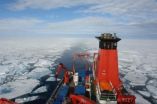(Press-News.org) The temperatures of North Atlantic Ocean water flowing north into the Arctic Ocean adjacent to Greenland -- the warmest water in at least 2,000 years -- are likely related to the amplification of global warming in the Arctic, says a new international study involving the University of Colorado Boulder.
Led by Robert Spielhagen of the Academy of Sciences, Humanities and Literature in Mainz, Germany, the study showed that water from the Fram Strait that runs between Greenland and Svalbard -- an archipelago constituting the northernmost part of Norway -- has warmed roughly 3.5 degrees Fahrenheit in the past century. The Fram Strait water temperatures today are about 2.5 degrees F warmer than during the Medieval Warm Period, which heated the North Atlantic from roughly 900 to 1300 and affected the climate in Northern Europe and northern North America.
The team believes that the rapid warming of the Arctic and recent decrease in Arctic sea ice extent are tied to the enhanced heat transfer from the North Atlantic Ocean, said Spielhagen. According to CU-Boulder's National Snow and Ice Data Center, the total loss of Arctic sea ice extent from 1979 to 2009 was an area larger than the state of Alaska, and some scientists there believe the Arctic will become ice-free during the summers within the next several decades.
"Such a warming of the Atlantic water in the Fram Strait is significantly different from all climate variations in the last 2,000 years," said Spielhagen, also of the Leibniz Institute of Marine Sciences in Keil, Germany.
According to study co-author Thomas Marchitto, a fellow at CU-Boulder's Institute of Arctic and Alpine Research, the new observations are crucial for putting the current warming trend of the North Atlantic in the proper context.
"We know that the Arctic is the most sensitive region on the Earth when it comes to warming, but there has been some question about how unusual the current Arctic warming is compared to the natural variability of the last thousand years," said Marchitto, also an associate professor in CU-Boulder's geological sciences department. "We found that modern Fram Strait water temperatures are well outside the natural bounds."
A paper on the study will be published in the Jan. 28 issue of Science. The study was supported by the German Research Foundation; the Academy of Sciences, Humanities and Literature in Mainz, Germany; and the Norwegian Research Council.
Other study co-authors included Kirstin Werner and Evguenia Kandiano of the Leibniz Institute of Marine Sciences, Steffen Sorensen, Katarzyna Zamelczyk, Katrine Husum and Morten Hald from the University of Tromso in Norway and Gereon Budeus of the Alfred Wegener Institute of Polar and Marine Research in Bremerhaven, Germany.
Since continuous meteorological and oceanographic data for the Fram Strait reach back only 150 years, the team drilled ocean sediment cores dating back 2,000 years to determine past water temperatures. The researchers used microscopic, shelled protozoan organisms called foraminifera -- which prefer specific water temperatures at depths of roughly 150 to 650 feet -- as tiny thermometers.
In addition, the team used a second, independent method that involved analyzing the chemical composition of the foraminifera shells to reconstruct past water temperatures in the Fram Strait, said Marchitto.
The Fram Strait branch of the North Atlantic Current is the major carrier of oceanic heat to the Arctic Ocean. In the eastern part of the strait, relatively warm and salty water enters the Arctic. Fed by the Gulf Stream Current, the North Atlantic Current provides ice-free conditions adjacent to Svalbard even in winter, said Marchitto.
"Cold seawater is critical for the formation of sea ice, which helps to cool the planet by reflecting sunlight back to space," said Marchitto. "Sea ice also allows Arctic air temperatures to be very cold by forming an insulating blanket over the ocean. Warmer waters could lead to major sea ice loss and drastic changes for the Arctic."
The rate of Arctic sea ice decline appears to be accelerating due to positive feedbacks between the ice, the Arctic Ocean and the atmosphere, Marchitto said. As Arctic temperatures rise, summer ice cover declines, more solar heat is absorbed by the ocean and additional ice melts. Warmer water may delay freezing in the fall, leading to thinner ice cover in winter and spring, making the sea ice more vulnerable to melting during the next summer.
Air temperatures in Greenland have risen roughly 7 degrees F in the past several decades, thought to be due primarily to an increase in Earth's greenhouse gases, according to CU-Boulder scientists.
"We must assume that the accelerated decrease of the Arctic sea ice cover and the warming of the ocean and atmosphere of the Arctic measured in recent decades are in part related to an increased heat transfer from the Atlantic," said Spielhagen.
INFORMATION:
Warming North Atlantic water tied to heating Arctic, according to new study
2011-01-28
ELSE PRESS RELEASES FROM THIS DATE:
Study reveals how fusion protein triggers cancer
2011-01-28
ANN ARBOR, Mich. — What happens when two proteins join together? In this case, they become like a power couple, where the whole is greater than the sum of the parts.
API2 and MALT1 are two proteins that become fused together in a subset of lymphomas. The API2 part of the fusion connects with an enzyme called NIK. When it does, MALT1 comes in for the kill, splitting NIK in two, a process called cleavage.
The result? NIK is stronger than ever. It sheds its "conscience" by removing a regulatory region of the enzyme that forces NIK to behave and self-destruct. Consequently, ...
Expert questions Lansley's key arguments for NHS reform
2011-01-28
England's health secretary Andrew Lansley has said that his reforms for the NHS are needed because the country's health outcomes are among the poorest in Europe. But in an article published on bmj.com today, John Appleby, Chief Economist at the King's Fund, reviews the data and finds the UK in better health than Lansley suggests.
It has been claimed that despite spending the same on health care, we suffer twice the rate of deaths from heart disease than France, says Appleby.
The latter is true, but what this claim doesn't show is that the UK has actually had the largest ...
Marriage is good for physical and mental health
2011-01-28
The 'smug marrieds' may have good reason to feel pleased with themselves as experts today confirm that long-term committed relationships are good for mental and physical health and this benefit increases over time.
In an editorial published by student BMJ, David and John Gallacher from Cardiff University say that on average married people live longer. They say that women in committed relationships have better mental health, while men in committed relationships have better physical health, and they conclude that "on balance it probably is worth making the effort."
Men's ...
Men more likely to stick with girlfriends who sleep with other women than other men
2011-01-28
AUSTIN, Texas—Men are more than twice as likely to continue dating a girlfriend who has cheated on them with another woman than one who has cheated with another man, according to new research from a University of Texas at Austin psychologist.
Women show the opposite pattern. They are more likely to continue dating a man who has had a heterosexual affair than one who has had a homosexual affair.
The study, published last month in the journal Personality and Individual Differences, provides new insight into the psychological adaptations behind men's desire for a variety ...
New transistor for plastic electronics exhibits the best of both worlds
2011-01-28
In the quest to develop flexible plastic electronics, one of the stumbling blocks has been creating transistors with enough stability for them to function in a variety of environments while still maintaining the current needed to power the devices. Online in the journal Advanced Materials, researchers from the Georgia Institute of Technology describe a new method of combining top-gate organic field-effect transistors with a bilayer gate insulator. This allows the transistor to perform with incredible stability while exhibiting good current performance. In addition, the ...
Caltech geobiologists uncover links between ancient climate change and mass extinction
2011-01-28
PASADENA, Calif.—About 450 million years ago, Earth suffered the second-largest mass extinction in its history—the Late Ordovician mass extinction, during which more than 75 percent of marine species died. Exactly what caused this tremendous loss in biodiversity remains a mystery, but now a team led by researchers at the California Institute of Technology (Caltech) has discovered new details supporting the idea that the mass extinction was linked to a cooling climate.
"While it's been known for a long time that the mass extinction is intimately tied to climate change, ...
Ben-Gurion U. researchers determine that a first medical opinion can influence the second
2011-01-28
BEER SHEVA, ISRAEL – January 27, 2011 -- A new study by Ben-Gurion University of the Negev (BGU) researchers indicates that physicians who give second opinions may be influenced by the first opinion and other external factors.
In the study, the researchers presented hypothetical scenarios with no clear cut clinical answers to a national sample of orthopedic surgeons and neurologists. Some were told that the patients had previously received treatment recommendations, but were not told what they were, while others were told the first opinion. One group was informed that ...
Watching TV coverage of terror makes viewers feel threatened
2011-01-28
Viewing TV coverage of terrorist events causes deterioration of psychological resources, such as commitment and a sense of success, and to feeling threatened, which in turn can also lead to loss of resources and other negative affects. This has been found in a new study at the University of Haifa. "Mass media plays a central role in reporting on terrorism and political violence. The present study shows that watching this type of coverage on television has negative effects, even for someone who was not at all involved in an event being viewed," said Prof. Moshe Zeidner, ...
Researchers uncover link to increased atherosclerosis risk in lupus patients
2011-01-28
Researchers in China have demonstrated interferon-alpha (IFN-a) is associated with increased risk of atherosclerosis in patients with systemic lupus erythematosus (SLE). For the first time, IFN-a priming was shown to promote lipid uptake and foam cell formation—a crucial step in plaque build-up. This activation of the IFN signaling pathway may be linked to the premature atherosclerosis risk in SLE. Full findings of this novel study are available in the February issue of Arthritis & Rheumatism, a journal published by Wiley-Blackwell on behalf of the American College of Rheumatology. ...
Training the brain to think ahead in addiction
2011-01-28
Philadelphia, Pa, 27 January 2010 - The growing numbers of new cases of substance abuse disorders are perplexing. After all, the course of drug addiction so often ends badly. The negative consequences of drug abuse appear regularly on TV, from stories of celebrities behaving in socially inappropriate and self-destructive ways while intoxicated to dramatization of the rigors of drug withdrawal on "Intervention" and other reality shows.
Schools now educate students about the risks of addiction. While having a keen awareness of the negative long-term repercussions of substance ...



